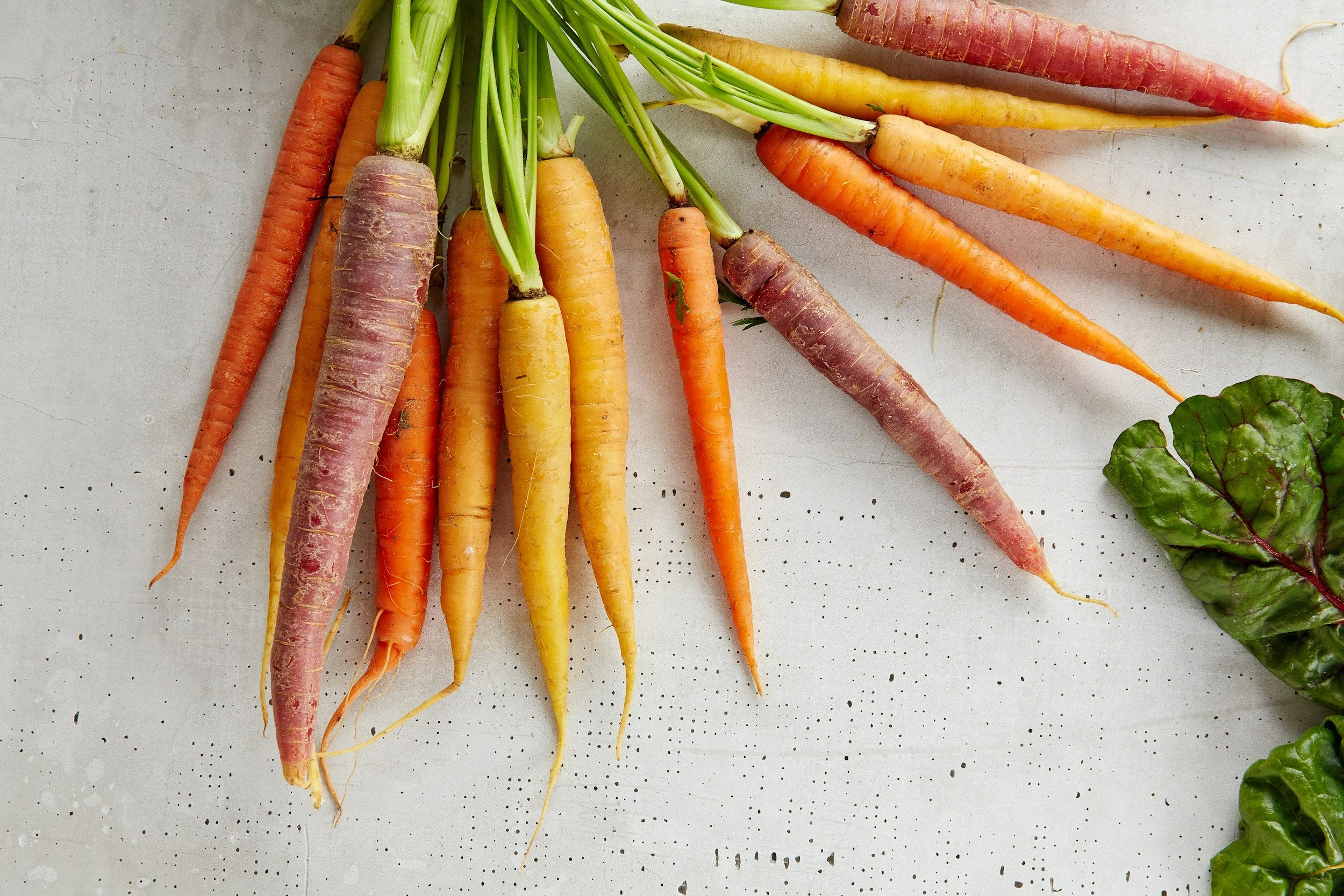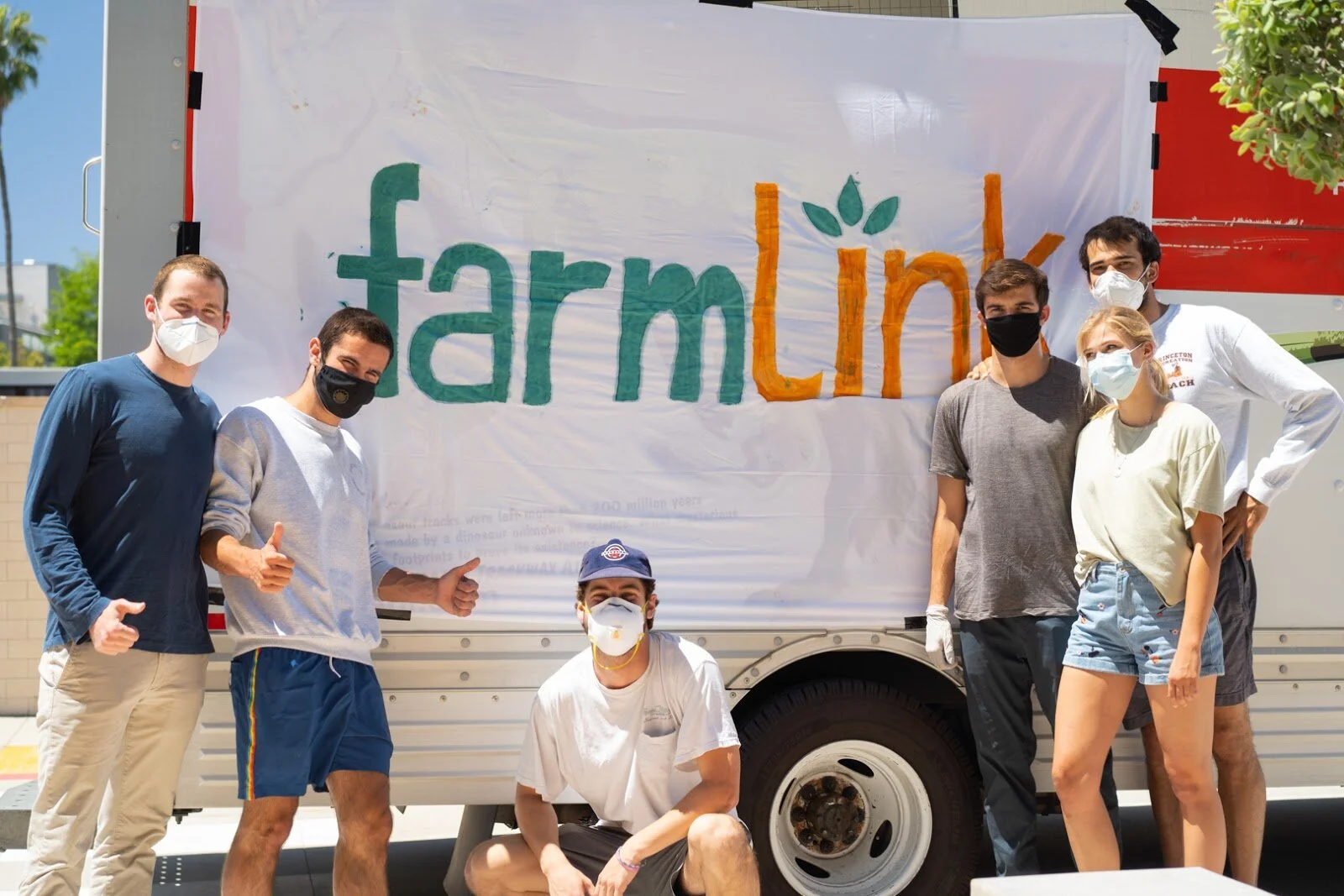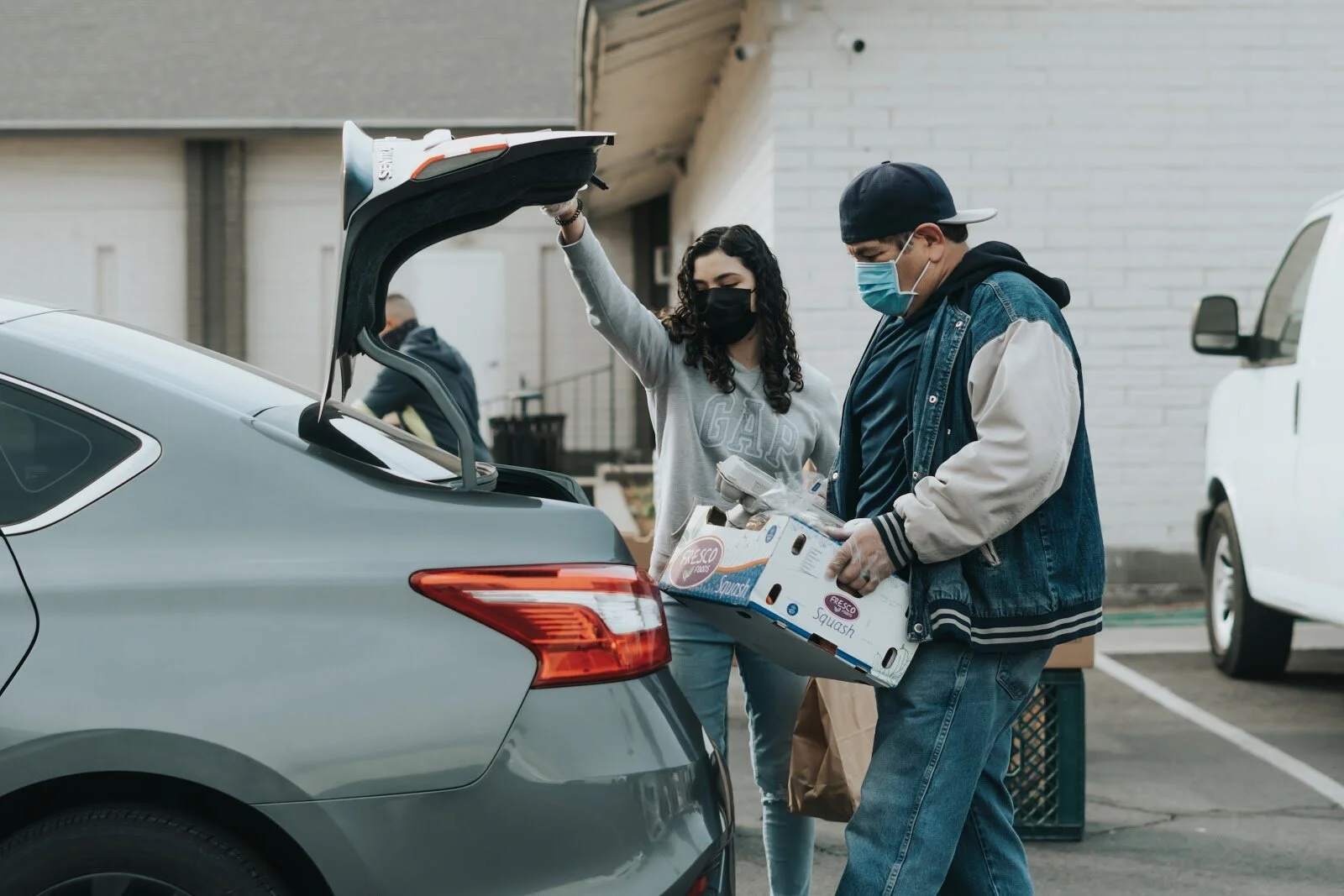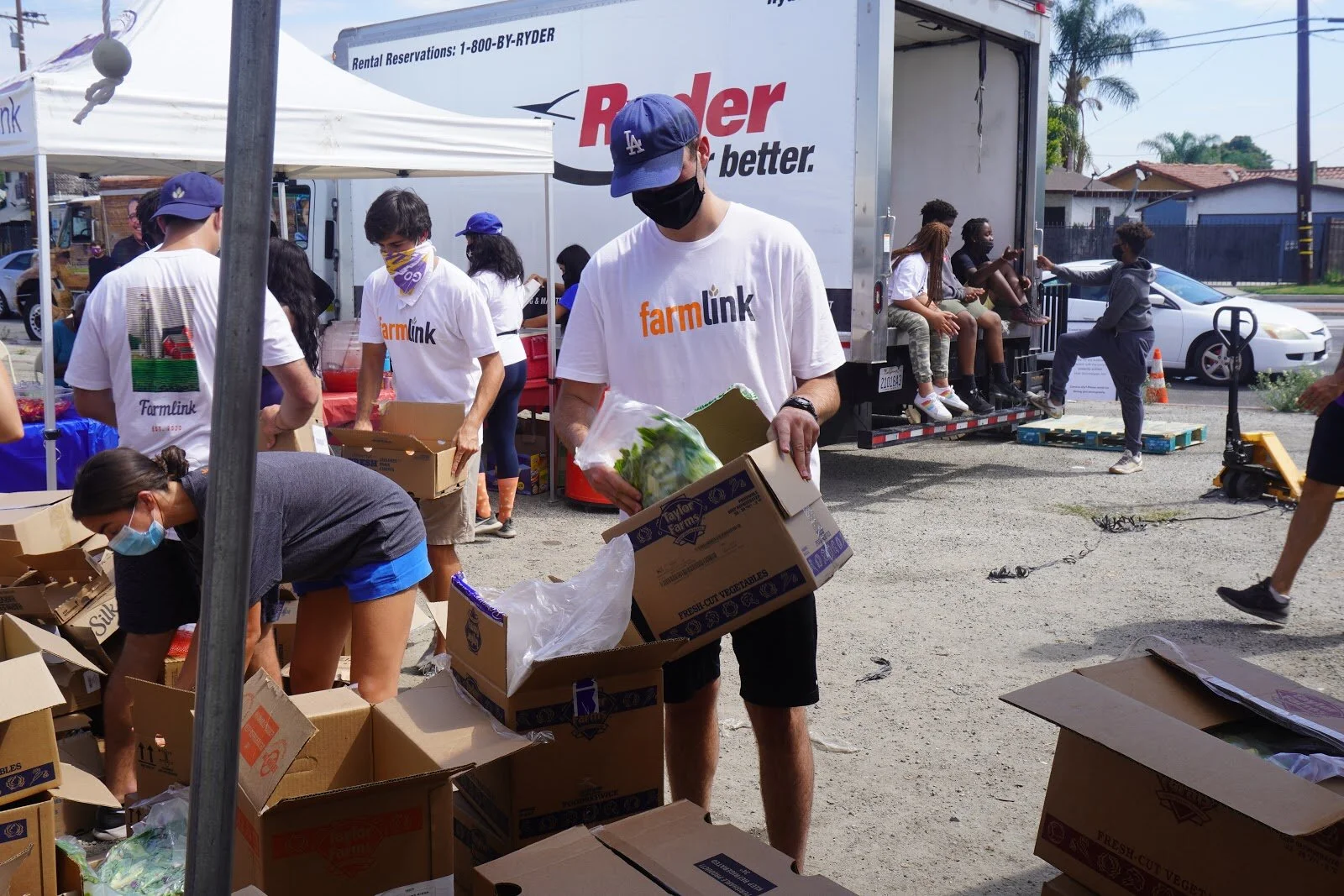
Recently published news and opinions from Food Recovery Network
Celebrating a Year of Food Recovery with The Farmlink Project
On April 16, 2020, a handful of friends drove 10,800 eggs in a rented truck from Trafficanda Egg Ranches Inc. to Food Finders in Southern California, hoping to make even a small difference for those in need at the start of the pandemic. Only two days later, on April 18, they helped connect 50,000 pounds of onions from Owyhee Produce in Oregon to Santa Monica’s Westside Food Bank. Starting The Farmlink Project with just a rented U-Haul and a few friends, the founders of this organization had no idea at the time what The Farmlink Project would become. Almost a year later, our internal team has grown by the hundreds, our network of external support has extended far beyond what we ever thought was possible, and we’ve continued to do what we do best - get surplus produce to people who need it.
How We’ve Gotten to Where We Are
The Farmlink Project has been incredibly lucky in securing and maintaining partnerships nationwide that have allowed us to scale our operations up in such a short period of time. Food Finders, our fiscal sponsor, has made it possible for us to accept the donations that fuel our work under its 501c3 status. Since The Farmlink Project’s first week, Uber Freight has been an enthusiastic supporter of ours and ended up covering 98% of The Farmlink Project’s deliveries in 2020, much of which was provided for free through Uber Freight’s Move What Matters campaign. November brought a partnership with Chipotle, which allowed customers nationwide to round up to the dollar to support The Farmlink Project when ordering online. The round-up campaign yielded a total of 1.23 million dollars in donations. The Food Recovery Network has been an incredibly valuable resource in helping us to grow our external team.
The way we move food is simple. We identify surplus produce, find a food bank that will take it, organize transportation, and provide aid to farmers. Since the beginning, our Farms Team has reached out directly to farmers to source surplus produce. Our Hunger Outreach Team identifies communities in need, and our Deals Team coordinates the logistics of getting this food to food banks and then to people. Our Growth Projects aim to expand the services we offer farmers, improve the way we source produce, and create a more sustainable future for our organization as well as the food system. We make an effort every day to stay connected with the parties we work with and to understand their needs. Each of our internal volunteers satisfies a weekly “Doug Hess” standard, named for one of the first farmers we worked with in recognition of his unwavering passion and hard work, by attending a team Power Hour, volunteering at a local farm or food bank, or helping out at a Farmlink Project delivery.
What We’re Up to Today
To date, we have facilitated the delivery of almost 30 million pounds of food. Our organization has expanded into Mexico, where we’ve moved more than 250,000 pounds of produce since the start of 2021. We’ve raised more than five million dollars since our founding, and, as we are 100% volunteer-run, each individual donation goes directly to minimizing food waste and alleviating food insecurity. On March 25th, The Farmlink Project Co-Founders James Kanoff and Aidan Reilly were awarded the Congressional Medal of Honor, Service Act Award, which they accepted on behalf of the team as a whole. As James said in an organization-wide meeting, “This award does not just celebrate what we have accomplished thus far––it speaks to what we have left to do and emphasizes the faith the Medal of Honor Society has that we will go on to make an even greater impact.”
The Future of The Farmlink Project
Our mission, strategy, and culture have remained intact throughout our year of incredible growth. As an organization, we are passionate, ambitious, and scrappy. We pride ourselves in being a group of young people who, like our friends at the Food Recovery Network, care deeply about the issues we fight for every day. Our long-term goal is to put ourselves out of business—to help create a new food system in which our work would be obsolete. The Farmlink Project will continue the work we’ve done this year in tackling the systemic issues in the food supply chain, and by building and implementing infrastructure, we hope to eradicate the issues of food waste and food insecurity entirely. We continue to push ourselves to look at these problems from all angles so that we can find creative, innovative ways to solve them.
College to Career: How FRN Supported Me In Finding My Career
This spring, the Resource Development and Program Support Committee of Food Recovery Network’s (FRN) Student and Alumni Advisory Board (SAAB) is sharing a series of blog posts about how participating in FRN during college can assist students in finding rewarding careers post-graduation.
Elaine, a member of SAAB leader and FRN Chapter founder, starts off the series with her story about how her involvement with FRN taught her important skills and focused on her career goals.
About Me and My Connection to FRN
Food systems have interested me for many years, and I have been concerned about climate change for as long as I can remember. I first learned about FRN at a sustainability conference in 2018, and I instantly recognized food recovery as an important tool in the fight against climate change. Food recovery was the nexus of my interests in food systems, social justice, and climate change mitigation. On the drive home from the sustainability conference, I started devising a plan to implement an FRN chapter at my school.
In January 2019, the chapter that I founded at Western Kentucky University (WKU) carried out its very first food recovery. In the two years since, FRN at WKU has recovered over 5,500 pounds of food from thirteen food businesses and connected that food with people experiencing hunger in the community via a dozen different hunger-fighting nonprofit partner agencies. In doing so, more than 50 unique volunteers have carried out well over 300 separate food recoveries.
Caption: Dropping off recovered bagels at the WKU Office of Sustainability Food Pantry.
Leading my chapter taught me invaluable skills that I will use in my future jobs: I have learned how to recruit and manage volunteers, develop new programs, juggle multiple responsibilities at once, form relationships with other organizations, make time-sensitive decisions under pressure, and keep organized records of data.
FRN Forging a Pathway Into My Career
Like many FRN volunteers, I plan to work in sustainable food systems for the remainder of my career. My experiences with FRN have provided me with valuable food recovery-specific knowledge that would make me a helpful addition to the team at any nonprofit or business that works in food recovery. These experiences have also given me knowledge and experience that would be beneficial in any position. After the chapter I founded had been operating for a semester, I wanted to become more involved with FRN. I applied to join SAAB, for which I have now served as a committee chair for two terms. My position on SAAB, for which I lead a committee of FRNds from across the country, has taught me valuable leadership and organizational skills. A few months after applying for SAAB, I saw a listing for an internship with FRN’s Food Recovery Verified (FRV) program in a newsletter from FRN National and quickly applied. Over the next year, I had the opportunity to serve as the FRV intern for three separate terms. Through my internship, I gained proficiency in several commonly-used data management platforms and learned how to evaluate and develop nonprofit programs. I developed remote-working skills, which have proved very useful in my current remote-work position. Furthermore, I developed strong relationships with my mentors at FRN, who are immensely supportive and go out of their way to share professional development resources and advice with me.
Caption: Harvesting tomatoes during the first glean I organized for Glean Kentucky.
I graduated in December 2020, but I am still involved in food recovery work. Since last fall I have worked in a program development position for Glean Kentucky, implementing a regional gleaning initiative. Without the support and advice that FRN National gave me when FRN at WKU was still a Chapter in Progress, I would have no idea how to form a school-specific food recovery organization, let alone a regional gleaning initiative that works with many farms, volunteers, and nonprofit partners. Every way that I have been involved with FRN - leading a chapter, serving on SAAB, working as an intern, and, most recently, volunteering as a Regional Outreach Coordinator - has increased my confidence in my abilities and taught me new and valuable skills.
“My involvement with FRN showed me that positive change can come with hard work and persistence and that every person is capable of making a difference. I will carry this knowledge with me throughout my career and continue pursuing opportunities to fight food waste and feed people.”
I encourage every FRN volunteer to become more involved in FRN’s programming whenever possible, from joining SAAB to joining the FRN Alumni Network Facebook group, so as to benefit from the varied, helpful, and important skills and resources that each opportunity offers. I am entirely confident that the lessons that I learned from FRN will continue to help me throughout my career, and I am sure that involvement with FRN will help students throughout the network kickstart meaningful and fulfilling careers. If you have not already signed up for FRN’s newsletter, joined the Portal, or joined the FRN Alumni Network Facebook group, take this opportunity to do so - connecting with FRN will bring you so many opportunities to make an impact, both as a student and as an alum!
FRN Advocacy Win: Expanded SNAP Benefits!
Introduction
We’re a full year into the pandemic (can you believe that?!) and this marathon sprint is catching up to us. Let’s take a moment to breathe deeply and celebrate some recent wins! Food Recovery Network (FRN) has flexed our advocacy skills by launching a new pilot program, the Advocacy Cohort, and by joining forces with Challah for Hunger to support the #FUELHigherEd Campaign.
Both of these projects center on raising awareness of food insecurity, and learning how to leverage our skills and stories to tackle the escalating issue of hunger. This year, we’re focusing on expanding SNAP benefits. The new administration heard our demand, and in January 2021 passed legislation to raise SNAP benefits by 15%! But let’s start with some background information.
What is SNAP?
The Supplemental Nutrition Assistance Program (SNAP) is a national program run by the federal government. You’ve probably heard of it referred to as food stamps. The purpose of this program is to aid individuals and families who are facing food insecurity by providing financial assistance for purchasing food.
SNAP is one of America’s largest, most far reaching safety net programs, attempting to support the 54 million people who face food insecurity in this country. Eligibility differs from state to state, but is largely based on your household income. Students are also eligible to receive food assistance from the government. Eligibility can be a difficult road to navigate, and continuing to prove your need for assistance also causes challenges. Information about SNAP eligibility can be hard to find; a lot of students don’t even realize they qualify for support. Further, meeting the eligibility requirements of being a student and a worker proves difficult: What happens if you lose your job because your class schedule changes? What can you do if your job interferes with your ability to properly perform in class? These are challenges that plague students in need of assistance.
Although SNAP supports hundreds of thousands of American citizens, there is still much room to grow in order to eradicate food insecurity completely. This may seem like a lofty goal, but it’s much more attainable than you think! That is why Food Recovery Network has committed to advocating for increased student access to and eligibility for SNAP.
How is FRN Involved?
In August 2020, FRN joined forces with Challah for Hunger on the #FUELHigherEd Campaign, focused on expanding SNAP eligibility for college students facing food insecurity.
Along with many other partner organizations, we’ve been able to...
Build advocacy skills with our student network through our Advocacy Cohort and Campaign Leader Trainings
Connect with local, state, and federal representatives to talk about the impact of food insecurity and food assistance programs in local communities and states
Host informative webinars with speakers who specialize in community organizing, state-level lobbying, and more
Join campaign leader trainings to learn from leaders and students in other organizations that are also interested in this work
Tweet at our representatives and engage with policymakers digitally
Build and share resources expanding our knowledge about how to advocate for SNAP, such as our advocacy toolkits focusing on on-campus organizing, community organizing, and state and federal level advocacy
If this is the first time you’re hearing about FRN’s advocacy efforts, welcome! If you’ve been doing this work with us since the start, we see you and we congratulate you. We’re one semester into the #FUELHigherEd campaign, and we’re rolling our sleeves up for the next one.
How can you get involved?
There are many ways for you to engage in the #FUELHigherEd campaign.
Sign your name to this letter to federal representatives demonstrating your support of #FUELHigherEd
Forward these links to five people to raise awareness of this issue
Find more information about FRN’s advocacy work here. If you’re a student, invite your chapter to work through FRN’s Advocacy actions on the FRN Student Portal. We have strength in numbers, so tell your friends about this work!
If you or someone you know is in need of food assistance, find out your eligibility for receiving SNAP here.
Recent SNAP Win!
It’s always important to celebrate your wins, especially in the field of advocacy. When the Biden administration took office in January 2021, one of its first actions was to expand SNAP benefits across the board. In light of COVID-19, the administration increased SNAP benefits by 15%, funneling more money to individuals and families. Biden additionally provided new money for food banks and childcare meals, hoping to provide direct assistance to families with young children who typically receive food assistance at school.
This is a massive step forward in tackling the issue of food insecurity, especially during the pandemic, and we’re grateful for the hundreds of organizations and individuals across the country that are working together to raise awareness about food insecurity and to demonstrate the need for more assistance to our governing officials.
But the work is not done. The pandemic still rages, creating an economic crisis and exacerbating food insecurity for millions of people. There is hope for more SNAP eligibility and benefit expansions with this new administration, and we applaud these recent wins. Regardless, we continue to strive to eradicate food insecurity in our country through enacting constructive change to anti-hunger policy.
An FRN Member’s Journey with The Farmlink Project
The Farmlink Project is quickly making a name for itself in the United States charitable food space. Like Food Recovery Network (FRN), The Farmlink Project is a national volunteer organization run almost entirely by college students, and its impact is astounding—over 25 million pounds of fresh food donated and over $5 million raised in less than one year. I’m an FRN member at the University of Virginia, which first brought me into contact with The Farmlink Project in July of 2020.
The Process, Projects, and People
The Farmlink Project locates surplus produce from farms across the country and coordinates the logistics to deliver that produce to food banks and community organizations. We have a myriad of teams that make this all happen, and since joining, I’ve been fortunate to find myself on the Farms Team—I’m one of the people who source food by contacting farms directly and starting the conversation about who we are and what we do. This part of the process is open externally, so I also host groups of volunteers, many of them connected through FRN, and introduce them to The Farmlink Project’s system of researching and calling farm contacts.
Over the winter and into this spring, Farmlink members began a number of “Growth Projects” working to expand our impact in the food insecurity space. I chose to get involved in several of these projects. One that I’m particularly excited about is called Tax Fluency, through which I’m working with lawyers and accountants to determine how Farmlink can help farmers take advantage of federal tax benefits when they donate their surplus food. While still a work in progress, this project may lead us to reach more farms with larger quantities of food, as well as significantly increasing our value-add for those organizations. Other Growth Projects include policy advocacy, nutrition education, alternative transportation, and more.
Steps Forward
The work we do to move surplus food to communities in need is exciting, important, and impactful, but the primary reason I love dedicating my time to The Farmlink Project is because of the incredible community and work environment I get to be a part of. Meetings are high-energy and upbeat. Power Hours are relaxing, and the work is satisfying. Most importantly, The Farmlink Project team members are some of the kindest, smartest, most passionate people I’ve ever met, and they inspire me to be a better person every single day. In the time I’ve spent on this team, I’ve only ever wanted to have the opportunity to do more.
If The Farmlink Project sounds interesting to you, you can start by checking out our website and joining our Power Hours! You could be personally responsible for sending tons (literally) of fresh produce to communities in need. Otherwise, you can subscribe to the newsletter, follow our social media, and tell your friends! The larger our network is, the greater impact we can have.
That’s my story with The Farmlink Project—one that is nowhere near over. And hopefully, your story will begin soon, too.
Our National Board of Directors Reflect on our new Strategic Framework
When we released Food Recovery Network’s strategic framework, FRN10X, we recognized that it was largely informed by a collection of stakeholder voices, experiences and perspectives. This is fitting as FRN has always been guided by those within the food-recovery movement and welcomed feedback to guide our approach and where we’re headed.
This winter, our Board of Directors hosted a series of conversations with their professional and personal networks to discuss FRN10X. During the conversations, they gave an update on the work we’ve accomplished to date, what’s ahead and how others can join the movement.
After those conversations, many of our Board Members reflected on the sense of excitement and inspiration they felt. We want to share their reflections with you.
Image: Tina Gooch Gailbrath
FRN’s Vice President, Tina Gooch Gailbrath reflected on the current, very difficult circumstances in which we all live because of the pandemic. Tina noted, “I am really excited about FRN's ability to pivot during this pandemic and help those in need. This is a difficult time and food insecurity is more rampant than ever, so it's critical that we adapt our program and continue to help. I am most excited about introducing new people to FRN. Anyone who hears about FRN's work is impressed and supportive. So it's fun to get the word out!”
Image: Frida Endinjok
Frida Endinjok, Student and Alumni Advisory Board President has dedicated her college years volunteering at FRN to raise her voice to highlight food insecurity among college students. Frida also mentors and teaches our FRN network her approach to advocacy work to give tools to more people to make a change on their college campuses to address this damaging issue of student hunger. Frida notes, “I'm always excited to share my work for it is not just based on my thoughts, but based on science. College food insecurity is real. How are college students asked to help others when they are food insecure themselves?.” Frida is a champion of equity and unapologetically requests that we look at who is affected by college student hunger, and who is able to help and notes, “Sadly, this is a problem among students of color and first-generation [college students], while other more advantaged students have time for ‘altruism.’”
Image: Matt Kruse
Sharing our work with as many people as possible is one of the best way for us to grow our movement. When people understand our model, they immediately connect with how we do our work. As a key function of their roles, the Board helps promote our work to new networks with the aim to get others inspired to be part of the movement. Matt Kruse noted, “overall, it was exciting for me to be able to contribute to FRN's cause in a new and dynamic way. Serving on the Board is a wonderful honor and I wouldn't trade it for anything. But to take off my "governance" hat for a few minutes and play a very direct role as an advocate for and champion of this movement is a real privilege.
Image: Jennifer Schmitt
FRN’s Board Secretary Jennifer Schmitt hosted a conversation with people from her personal and professional network and remarked, what struck her most was “how universal the issue of hunger and food waste is. We had people listening from 9 years to 70 years old, of varying backgrounds, ethnicities, and views. It was awesome how recovering food resonated with everyone.” Jennifer went on to remark, “I was most excited about sharing my work and passion [for Food Recovery Network] with friends and family.”
Maintaining our movement, keeping the work flowing is dependent upon our core people who continually do the work. Our students are our core, volunteering their time all across the country during college final exams, during winter and spring breaks. They volunteer while wildfires are raging and flooding and hurricanes devastated our communities because they know during these tragic moments, more people need them. Incredibly, twenty-five percent of our chapters have continued to recover during the pandemic. The amount of food they have recovered is equal to how much food 25% of our chapters recovered last year, pre-pandemic! This is a testament to their abilities and proves there is still so much food to be recovered.
Image: Claire Cummings
Claire Cummings has been on the Board of Directors for four years and previous to that sat on our Advisory Board. She understands deeply the power of our students and noted, ”I was really inspired hearing my co-Board member Bill [McConagha] talk about the opportunities for college student engagement and how volunteering with an FRN chapter is such a wonderful chance for students to do something meaningful and really see the tangible impact of their work. We are so often stuck in the world of hypotheticals and virtual connection, rarely do we get to directly have our hands involved in something that makes a difference in another person’s life and I was reminded that FRN is a great way for college students to do just that. It was really inspiring to have so many family members and people I work with learn about this organization I’ve been involved with for so many years, it felt like worlds colliding!”
Thank you to our National Board of Directors for sharing your insights with all of us, and for being part of the movement every single day. Food is a right. Together, we want to feed everyone who is hungry in this country with our beautiful, surplus food.



















